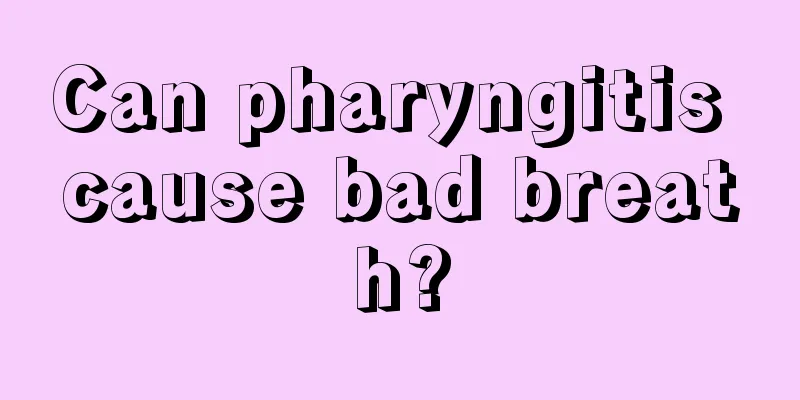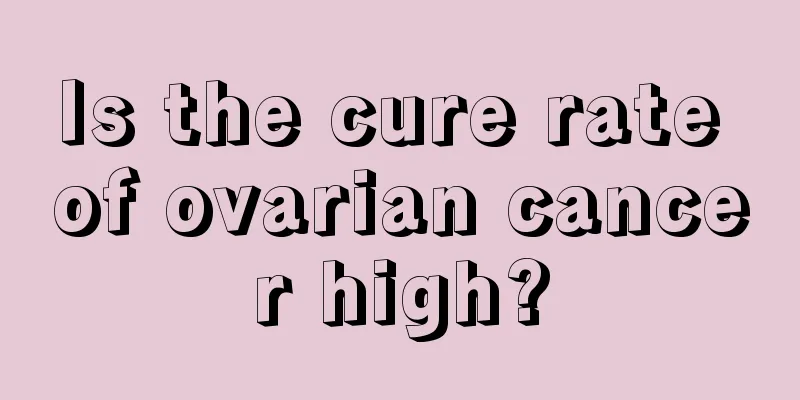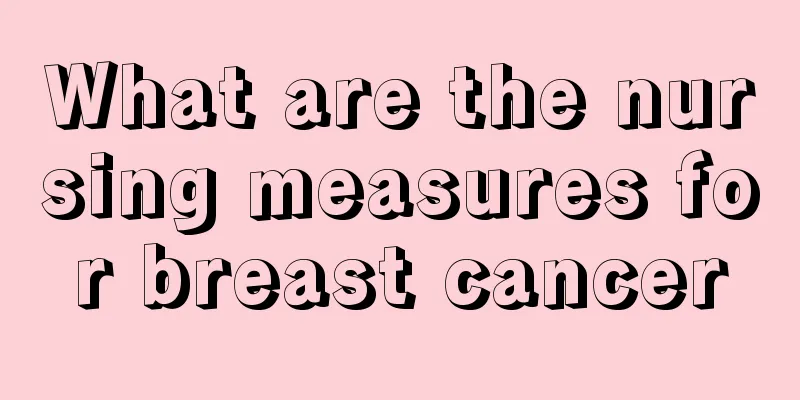Can pharyngitis cause bad breath?

|
Everyone has their own special scent, some are fragrant while others are not so pleasant. The same goes for the smell in the mouth. Some people have bad breath while others do not. The cause of bad breath may be insufficient spleen and stomach function, poor digestion causing food to accumulate in the stomach and produce odor. Some bad breath is caused by not brushing teeth for a long time and food residues accumulate in the mouth, resulting in bad breath. Can pharyngitis cause bad breath? Let's find out. There are many reasons for bad breath. You can also try soaking 50 grams of perilla leaves and 5 grams of osmanthus in water and drink it! You can also use reed root 60 to boil water and drink How to test your breath: Put your left and right palms together and make a closed bowl shape, cover your mouth and nose, then exhale into your palms and then inhale through your nose, you can smell how your breath smells. Causes of bad breath: Oral diseases: People with oral diseases such as caries, gingivitis, periodontitis, oral mucositis, tooth decay, and periodontal disease are prone to the growth of bacteria in their mouths, especially anaerobic bacteria, which decompose and produce sulfides, giving off a corrupt smell and causing bad breath. Gastrointestinal diseases, such as peptic ulcer, chronic gastritis, functional dyspepsia, etc., may be accompanied by bad breath. Recently, we have also found that the incidence of bad breath in people infected with Helicobacter pylori, which causes many gastric diseases, is significantly higher than that of uninfected people. After the eradication of Helicobacter pylori, the symptoms of bad breath are significantly alleviated. The reason may be that Helicobacter pylori infection directly produces sulfide, which causes bad breath. People who smoke, drink alcohol, drink coffee, and often eat spicy foods such as onions, garlic, and leeks, or who are addicted to smelly foods such as stinky tofu and rotten eggs, are also prone to bad breath. Dieting to lose weight, or not being able to eat due to illness, or the reduced salivary gland function of the elderly, or endocrine disorders in women during menstruation, which leads to reduced saliva secretion, is conducive to the growth of anaerobic bacteria, thus causing bad breath. Bad breath in teenage girls: Some women in puberty have ovarian dysfunction and low sex hormone levels, which reduces the resistance of oral tissues and makes them more susceptible to infection with bacteria, resulting in bad breath. Drugs that can reduce saliva secretion, such as certain sedatives, antihypertensive drugs, atropine drugs, diuretics, and traditional Chinese medicines with warming and tonic effects. Patients with diabetic ketoacidosis, hepatic coma, and some respiratory diseases such as bronchitis, bronchiectasis, sinusitis, pharyngitis, tonsillitis, lung cysts, etc. may also cause bad breath. Long-term constipation can cause the harmful substances produced in the body to be absorbed into the blood and cause bad breath, abdominal distension, loss of appetite, irritability and other symptoms of autointoxication. Dinner is too "heavy", eating too much or eating too much meat, greasy food or too much spicy seasoning, too much strong flavor and not enough light food, too short a time between dinner and sleep, too much food left in the stomach when sleeping, etc. Excessive psychological pressure and frequent mental tension cause the body's parasympathetic nerves to be in an excited state, which reflexively leads to a decrease in the secretion of the digestive glands, especially the salivary glands, resulting in dry mouth, which is conducive to the growth of anaerobic bacteria and produces bad breath. Mental factors. The patient has no bad breath, and doctors and other people cannot smell it either. However, the patient insists that he smells bad breath and "finds" that others "always avoid me", "don't interact with me", "stay away from me when talking". When others occasionally scratch their noses or touch their faces, the patient insists that "they smell my bad breath and are about to cover their noses, but because of my face and fear of embarrassing me, they turn to "scratch their noses, touch their faces" and other actions to cover it up". They have neurotic and obsessive-compulsive tendencies, which are more common in hypochondriasis. Such patients suffer psychologically, so we hope that everyone will not discriminate against them, care more about them, and give them confidence. Prevention and treatment of bad breath First, pay great attention to oral hygiene, brush your teeth and rinse your mouth carefully every morning, before going to bed, and after meals. If necessary, use a toothbrush or a clean towel to gently brush off the tongue coating. Secondly, quit smoking and drinking; eat relatively light food, avoid eating raw, cold, irritating, smelly (such as garlic, onion, leek, stinky tofu, etc.) and indigestible, greasy (high-protein, high-fat) food; chew slowly when eating; drink more water, eat more vegetables, fruits and beans; have a regular life and work schedule, keep a good mood; participate in more physical exercise. Traditional Chinese medicine believes that bad breath is caused by "heat" in the gastrointestinal tract, so it is recommended to eat less heat-inducing and cold-dispersing foods, and eat some heat-clearing foods in moderation. In terms of treatment, the primary disease should be actively treated first. For diseases of the oral cavity, digestive system, respiratory system, etc. that can cause bad breath, corresponding treatment should be actively carried out; since bad breath is often caused by anaerobic or facultative anaerobic bacteria infection in the oral cavity or digestive tract, you can take tinidazole or metronidazole (not to exceed 7 days), which is a drug for treating anaerobic or facultative anaerobic bacteria; Bad breath caused by Helicobacter pylori infection can be treated with drugs that cure Helicobacter pylori. You can also use 10 grams of Chinese medicine Perilla frutescens, brewed with boiling water (like brewing tea, use Perilla frutescens to replace tea) 1-2 times a day, which is better than some chewing gum; Tapping teeth is also a good method: close your lips and tap your teeth gently 100-300 times. During this time, you may produce more saliva. Swallow it slowly in small sips. Do this 2-3 times a day. It not only treats bad breath, but also has a good effect on oral diseases. You may want to give it a try. In addition, for those with bad breath caused by mental factors, medication is ineffective and they need to see a psychologist. In traditional Chinese medicine, bad breath is mainly caused by spleen heat, stomach fire, intestinal dryness, etc., and there are also differences between deficiency and excess. Therefore, if you want to take Chinese medicine for bad breath, you must find an experienced Chinese medicine doctor to prescribe it. You cannot choose Chinese medicine on your own, because Chinese medicine for "clearing stomach fire" is very bitter and cold, and it is very easy to damage the spleen and stomach after taking it, resulting in bad breath before the spleen and stomach are damaged. In many years of clinical practice, Dr. Hu has explored a method of using Chinese medicine to harmonize the spleen and stomach, and to treat bad breath with both cold and heat. It can not only eliminate bad breath, but also protect the spleen and stomach, and the effect is very good. |
<<: How to quickly reduce lip swelling
>>: What is the normal color of the blood vessels under the tongue?
Recommend
What to do if your feet are dry and rough
In life, most people pay more attention to the sk...
Digestive tract bleeding in advanced liver cancer
Advanced liver cancer gastrointestinal bleeding G...
What items are checked in the premarital check-up?
Premarital examination is a very important matter...
Sub-health is not scary, the key is to insist on "prevention"
How to alleviate sub-health is an urgent matter. ...
Can I get breast cancer during pregnancy
Can you get breast cancer during pregnancy? Perha...
How to remove oil stains from clothes
In our daily lives, we often accidentally find th...
I always feel very tired and exhausted
In modern life, there is no motivation without pr...
For the sake of health, these 10 things must be thrown away
1. Bath Ball There are usually 7.2 billion bacter...
How much does lung cancer surgery cost?
Lung cancer can metastasize through blood circula...
What material is good for pajamas
Good sleep is a wonderful experience of life and ...
How long can you survive after surgery for early colorectal cancer
Early colorectal cancer patients usually have a l...
What is the disease of multiple nodules in both lungs
Multiple nodules in both lungs can be said to be ...
The efficacy and effects of chestnuts soaked in vinegar
The nutritional value of chestnuts themselves is ...
Can lymphoma be cured? What is the cause?
Can lymphoma be cured? What causes it? 1. This ha...
Upper mediastinal tumor
Tumors are some of the more common physical probl...









